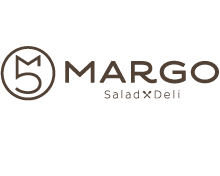
Salad Deli MARGOは持続可能な開発目標(SDGs)を支援しています。

旬を大切にした日本の野菜でCO2抑制
旬の国産野菜が中心のMARGOサラダは、産地をリレーしながら環境負荷を少なく栽培。配送距離も最短でCO2排出を最小限にします。
【成果】
難しかったロメインレタスの通年国産化が実現でき、海外からの輸送に比べてCO2排出量は56%に抑えられました。
CO2 control with Japanese vegetables that value the season
MARGO salad, which is mainly made from seasonal domestic vegetables, is cultivated with less
environmental impact while relaying the production area. It also has the shortest delivery distance and
minimizes CO2 emissions.
【Results】
We were able to produce romaine lettuce domestically throughout the year, which was difficult, and reduced CO2 emissions to 56% compared to shipping from overseas.

使い捨て品の無料配布をやめて脱プラ
スプーンやレジ袋など使い捨て品の無料配布を止めて脱プラスチックを推進。
必要時は有料購入のご理解・ご協力をいただいています。
【成果】
2023年のレジ袋の提供数が76%減少、プラスティックスプーン(植物由来)は54%減少(2020年比)。年を追うごとに、プラスチック資材の購入数が減ってきています。
MARGOが使うプラ容器のほとんどを、紙容器やペットボトル再生品、生分解されるバイオプラに切り替えています。
Stop free distribution of disposable items and remove plastic
Stop free distribution of disposable items such as spoons and shopping bags and promote deplasticization.
We ask for your understanding and cooperation in paying purchases when necessary.
【Results】
In 2023, the number of plastic bags provided will decrease by 76%, and the number of plastic spoons (plant-based) will decrease by 54% (compared to 2020). As the years go by, the number of plastic materials purchased is decreasing.
Most of the plastic containers used by MARGO have been replaced with paper containers, recycled plastic bottles, and biodegradable bioplastics.

消費期限の延長工夫でフードロス抑制
調理・衛生・保存方法の改善のほか、食材の品種改良で消費期限を延ばし最小限の食品廃棄に努めます。
【成果】
サラダ類の消費期限が約1.5倍に延ばせたことで、食品の廃棄率は5%程度(2019年)から2.5%以下(2024年)に半減できています。どうしても売れ残った商品は、廃棄することなく、働くスタッフの「まかない食」として喜ばれています。
Suppressing food loss by extending the expiration date
In addition to improving cooking, hygiene, and preservation methods, we will extend the expiration date by
improving the variety of ingredients and strive to minimize food waste.
【Results】
By extending the expiry date of salads by about 1.5 times, the food waste rate has been halved from around 5% (2019) to less than 2.5% (2024). Unsold products are not thrown away and are enjoyed as ”meal food” for working staff.

再生スピードの早い竹箸採用で森林保護
木の割箸から、生長の早い竹の割箸に変更。炭化処理の竹は、漂白や防カビの手間がなく安全で省資源です。
【成果】
全量を炭化処理の竹箸に変更し、包装袋も紙に変えました。木の割箸&プラスチック包装袋に比べてコストは割高ですが、プラごみ排出ゼロを達成しています。
プラスチックスプーン&フォークの包装袋も紙に変わり、こちらもプラごみ0になりました。素材は植物由来のプラスチックです。
Forest protection by adopting bamboo chopsticks with fast regeneration speed
Changed from wooden chopsticks to bamboo chopsticks that grow fast. Carbonized bamboo is safe and
resource-saving without the hassle of bleaching and mold prevention.
【Results】
All chopsticks were changed to carbonized bamboo chopsticks, and the packaging bags were also changed to paper. Although it is more expensive than wooden disposable chopsticks and plastic packaging bags, it achieves zero plastic waste.
The packaging bags for plastic spoons and forks have also been changed to paper, and now there is no plastic waste. The material is plant-based plastic.

ロスを出さない適正な生産計画で製造者責任を明確に
過剰な供給を見直し、ニーズに見合った”足るを知る”健全な生産計画を定めます。
【成果】
MARGOのセントラルキッチンで1日に出る生ゴミ量は、45Lゴミ袋で2袋以下に抑えられています。1日に1000~1500食を提供する食品の製造過程では、圧倒的に少ない生ゴミの排出量です。
Clarify manufacturer responsibility with an appropriate production plan that
does not cause loss
Review excess supply and establish a sound production plan that “knows enough” to meet your needs.
【Results】
The amount of food waste generated in MARGO’s central kitchen per day has been kept to less than two 45L garbage bags. In the food manufacturing process that serves 1,000 to 1,500 meals a day, the amount of food waste produced is extremely small.

